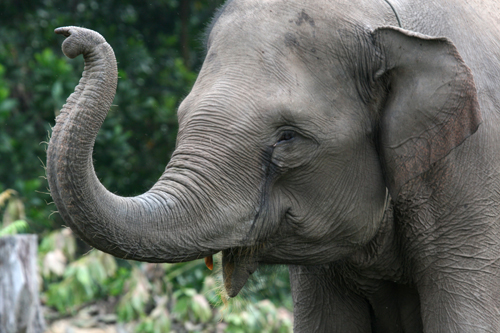JAKARTA – An immediate moratorium on habitat conversion is needed to secure a future for Sumatran elephants, conservation organization WWF says. The Sumatran elephant has been uplisted from “endangered” to “critically endangered” after losing nearly 70 per cent of its habitat and half its population in one generation. The decline is largely because of elephant habitat being deforested or converted for agricultural plantations.
IUCN has classified the Sumatran elephant subspecies (Elephas maximus sumatranus ) as critically endangered on its Red List of Threatened Species. There are only an estimated 2,400 to 2,800 of the animals remaining in the wild, a reduction of about 50 per cent from the 1985 population estimate. Scientists say that if current trends continue, Sumatran elephants could be extinct in the wild in less than 30 years.
According to the IUCN Red List, “Although as a species Sumatran elephants are protected under Indonesia law, 85 per cent of their habitats which are located outside of protected areas, are outside of the protection system and likely to be converted to agricultural and other purposes.”
Sumatra is thought to hold some of the most significant populations of Asian elephants outside of India and Sri Lanka. Yet within the Asian elephant’s range, Sumatra has experienced perhaps the most rapid deforestation rate. Sumatra has lost over two-thirds of its natural lowland forest in the past 25 years – the most suitable habitat for elephants – resulting in local extinctions of the elephant from many areas.
“The Sumatran elephant joins a growing list of Indonesian species that are critically endangered, including the Sumatran orangutan, the Javan and Sumatran rhinos and the Sumatran tiger,” said Dr. Carlos Drews, Director of WWF’s Global Species Programme. “Unless urgent and effective conservation action is taken these magnificent animals are likely to go extinct within our lifetime.”
WWF is calling on the Indonesian government to prohibit all forest conversion in elephant habitats until a conservation strategy is determined for conserving the animals. The organization recommends that the government conduct an assessment to determine large habitat patches and designate them as protected areas. Additionally, smaller habitat areas should be linked with conservation corridors, and areas of possible habitat expansion or restoration explored.
“It’s very important that the Government of Indonesia, conservation organizations and agro-forestry companies recognize the critical status of elephant and other wildlife in Sumatra and take effective steps to conserve them,” said Asian elephant expert Ajay Desai. “Indonesia must act now before it’s too late to protect Sumatra’s last remaining natural forests, especially elephant habitats.”
In Sumatra’s Riau Province, where pulp and paper industries and oil palm plantations are causing the some of the world’s most rapid rates of deforestation, elephant numbers have declined by a staggering 80 per cent in less than 25 years. Habitat fragmentation has confined some herds to small forest patches, and these populations are not likely to survive in the long term.
“Riau Province has already lost six of its nine herds to extinction. The last surviving elephants may soon disappear if the government doesn’t take steps to stop forest conversion and effectively protect the elephants,” said Anwar Purwoto of WWF-Indonesia. “Forest concession holders such as pulp and paper companies and the palm oil industry have a legal and ethical obligation to protect endangered species within their concessions.”
Similarly, Lampung Province has seen its number of elephant herds decline from twelve in the 1980s to only three by 2002 as a result of forest loss. Just two of the remaining herds are considered biologically viable.
“In the mid-1980s, Sumatra had 44 elephant populations spread across all of its eight provinces, and the island still had half of its natural forests,” said Dr. A. Christy Williams, Head of WWF’s Asian Elephant Programme. “Due to conversions of those forests for human settlement and agricultural production, many elephant populations have come into serious conflicts with humans. As a result, a large number of elephants have been captured from the wild or killed.”
WWF calls upon all stakeholders, including the Government of Indonesia, oil palm companies, members of the pulp and paper industry and conservation organizations, to work together to conserve Sumatran elephant habitat. Urgent measures are needed to protect Sumatra’s remaining natural forests so that future generations of Indonesians can inherit a natural heritage that includes wild elephants, tigers, orangutans and rhinos.
###
For additional information, please contact:
- Sunarto, WWF-Indonesia, sunarto[at]wwf[dot]or[dot]id, tel: +62 811 995 0521.
- Alona Rivord, WWF-International, arivord[at]wwfint[dot]org, tel: +41 79 959 1963














